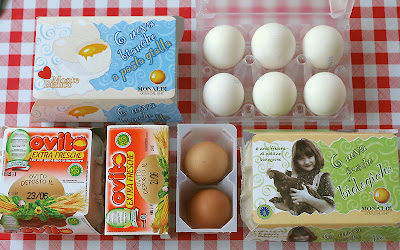Photo Credit: Rubber Slippers In Italy
Italian Commercial Eggs! How cute!
Although organic eggs are nutritionally better for you, they may not have been handled in a way that insures they remain so. To quote Dr. Mercola,
"Some states require that all eggs receive a chlorine bath and mineral oil coating before they are nestled into their cartons."
I know some of you are groaning at your computer screen right now. But you need to know what's going on so you can make an informed decision. Store bought organic eggs might be a better choice, but they may not be the best.
Egg shells are a membrane that contain up to 7,500 - 8,000 pores (openings). When a chicken lays an egg, by God's wonderful design, it's covered in a waxy substance (the bloom) that protects the membrane from bacteria passing through to the inside of the egg, provided it's not washed off. This membrane also prevents gases from being transferred such as carbon dioxide and moisture within the egg to be retained. Loss of the bloom compromises the egg, causing it to begin deteriorating more rapidly.
Dr. Ken W. Koelkebeck of the University of Illinois states that there is also two inner membranes that help protect the egg:
"Microbiological contamination of the inside of the egg is greatly affected by the ability of the egg shell to stop the invasion of micro-organisms and bacteria from entering the egg through the shell’s pores. When the cuticle or bloom is deposited by the hen on the shell this acts as a barrier to keep bacteria from entering the egg. When eggs are washed, however, this removes most if not all of the cuticle from the shell surface. Thus, bacteria have an easier time entering the egg after washing. Even when the cuticle is removed, the two inner shell membranes help prevent bacteria from entering the egg. These barriers provide a good line of defense against invading bacteria."
Another consideration is the agent that is used to wash the egg itself. Some of the cleansers used by companies include:
- Chlorine (sodium hypochlorate)
- Potassium hydroxide or sodium hydroxide (lye)
- Sodium carbonate
- Ozone
- Hydrogen peroxide
- Peracetic acid (peroxyacetic acid) -- a mixture of vinegar and hydrogen peroxide
Photo Credit: Tim Morgan
Keep in mind that when the bloom is removed, some portion of the cleaning agent will be absorbed through the membrane. You may be thinking, but these are organic eggs... they wouldn't use Chlorine or other synthetics to clean them, would they? Apparently the above list contains approved cleansers for even organic eggs. Yikes!
On to my second concern. Ideally, eggs should be processed the day after they are laid, however according to Mercola, the USDA's requirement is 30 days.
Commercial processing of eggs involves the following six steps:
1. Collecting the eggs
2. Cooling
3. Cleaning and disinfecting
4. Candling for quality and defects (such as cracks)
5. Grading for size
6. Packaging for the market
During the third step, cleaning and disinfecting, the eggs are washed, but in order to prevent the egg from deteriorating, the bloom must be replaced with something else, and the industry standard is mineral oil - a petroleum product (although some use vegetable oil as a natural alternative). How do you know what has been used on the eggs you are purchasing if you aren't able to ask the farmer?
• Most state egg laws do not specify washing methods.
• Eggs that are fresh and have an intact cuticle (bloom) do not need to be refrigerated, as long as you are going to consume them within a relatively short period of time.
• 95 percent of eggs purchased come from large farms, 245 of which house over 75,000 layers - all vying for nesting spaces and living in conditions that naturally come with that many chickens.
1. Collecting the eggs
2. Cooling
3. Cleaning and disinfecting
4. Candling for quality and defects (such as cracks)
5. Grading for size
6. Packaging for the market
During the third step, cleaning and disinfecting, the eggs are washed, but in order to prevent the egg from deteriorating, the bloom must be replaced with something else, and the industry standard is mineral oil - a petroleum product (although some use vegetable oil as a natural alternative). How do you know what has been used on the eggs you are purchasing if you aren't able to ask the farmer?
Photo Credit: Patent and the Pantry
Here are a few additional quick facts from Dr. Mercola's article:
• Eggs are typically 3 weeks old when they arrive at the supermarket.
• Most state egg laws do not specify washing methods.
• Eggs that are fresh and have an intact cuticle (bloom) do not need to be refrigerated, as long as you are going to consume them within a relatively short period of time.
• 95 percent of eggs purchased come from large farms, 245 of which house over 75,000 layers - all vying for nesting spaces and living in conditions that naturally come with that many chickens.
• It is much easier to produce clean eggs than to clean dirty eggs. (I tell my daughter this who is in charge of keeping the coop clean all the time!)
Bottom line...
• Organic is still a better choice over conventionally raised eggs.
• Purchasing organic free range eggs from a local farmer is an even better choice.
• Raising your own is best. You will control production from start to finish, including when you collect eggs, how you store them, and whether or not you wash them.
Bottom line...
• Organic is still a better choice over conventionally raised eggs.
• Purchasing organic free range eggs from a local farmer is an even better choice.
• Raising your own is best. You will control production from start to finish, including when you collect eggs, how you store them, and whether or not you wash them.





